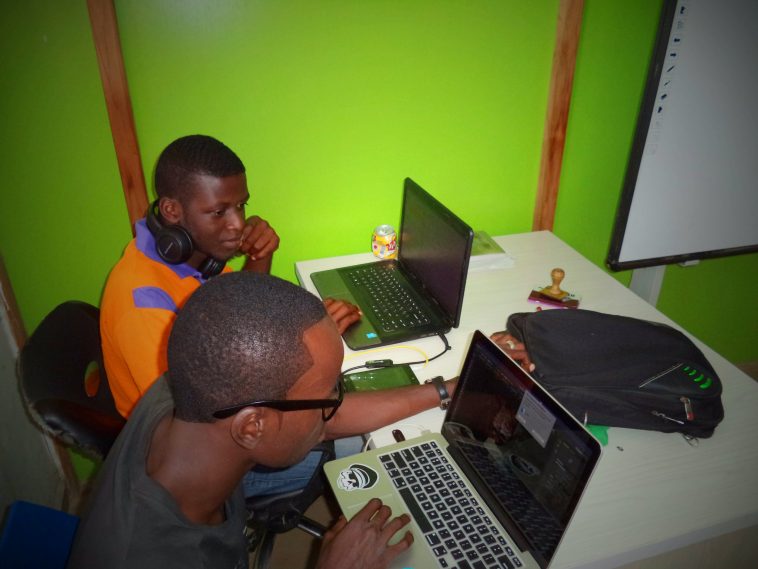In 2014, Sanusi Ismaila relocated from Lagos to Kaduna with the vision of founding a technology hub to empower individuals to address real-world challenges. He was driven by the conviction that nurturing tech ecosystems in areas outside of Lagos was crucial, as local challenges are best tackled by those who intimately understand their context.
However, he soon encountered a significant hurdle: the absence of a talent pipeline that could support startups nationwide. To address this, he took a step back in the value chain to generate the necessary talent for creating high-quality products and startups.
By 2016, Ismaila had established CoLab, marking it as Kaduna’s inaugural tech hub and the second in the northern region of Nigeria. CoLab is a vibrant community for individuals pursuing tech careers and visionaries eager to share knowledge and forge connections.
Lagos serves as the cornerstone of the Nigerian tech landscape, akin to the role Silicon Valley plays within North America. However, unlike the U.S., where cities such as New York, Seattle, and Chicago also host robust tech ecosystems that enhance Silicon Valley’s influence, tech hubs outside Lagos face challenges establishing their presence and drawing stakeholder interest. Consequently, top tech professionals from these areas often find themselves compelled to relocate to more promising regions in search of superior opportunities.
On a bright afternoon in 2018, Pablo observed two young individuals entering the barbershop donned hoodies that bore the CoLab and Python logos. He had once ventured into data analytics but abandoned his efforts, attributing his discontinuation to a “lack of understanding.”
After engaging in a short dialogue with these individuals, he found out they were members of CoLab. A month later, he joined to study data analytics. Six years later, he is employed at AltSchool and holds the position of director of people and head of data science programs at CoLab, continuing to reside in Kaduna.
Originally a small gathering of young individuals clad in hoodies clustered around pre-owned HP laptops, the group has evolved into one of northern Nigeria’s largest sources of technological expertise. CoLab boasts a network of over a thousand graduates, some of whom have joined forces to establish startups like Sudo Africa, while others have secured positions at leading organizations such as Paystack, Microsoft, and Google.
This community’s impact was so significant that in May 2022, the Governor of Kaduna State, Nasir ElRufai, recognized their potential and allocated seven hectares of land to develop a campus to nurture even more technology professionals.
Excel Ajah, the founder of WritersGig, an online marketplace for freelance writers, has encountered difficulties hiring tech professionals. He attributes this challenge as a key factor slowing down the development of tech communities in Eastern regions.
He explains, “In places like Lagos, where the tech scene is more developed, it’s much simpler to find individuals skilled in the specific areas you need.”
The tech ecosystem in Imo State is still in its infancy, only starting to form around 2020. Ajah notes that this emergence can be traced back to when he and some colleagues began to gather in public spaces to work and talk about tech hubs like Lagos. This quickly led to efforts to mimic the communities and events observed in Lagos, culminating in the launch of The Owerri Business Week and Social Media Fest. These events have garnered significant interest and have now become yearly occurrences.
While continuing to operate WritersGig, Ajah embarked on a new venture, Silicon Africa, a tech innovation hub inspired by its San Francisco namesake. This new endeavor brought with it the necessity for hiring, presenting Ajah with his initial hurdle: a lack of available talent. Facing difficulties in sourcing skilled developers locally for his business, Ajah opted to train them himself.
“The first developers I brought on board are still with me today, having advanced to senior positions. They now mentor new, early-stage developers at the center,” he explained. “Observing this progression has been fascinating, as it has evolved into a self-sustaining cycle where those trained go on to train others.”
Chidi Duru, a co-founder based in Owerri, identifies a challenge in Imo’s tech ecosystem beyond a mere talent shortage. According to him, the real issue is the diminished interest in acquiring tech skills, primarily due to the prominence of internet fraud in the area in recent years. Duru’s initiative, CodeAnt, offers coding courses to the youth with backing from Google. Despite this support, persuading young individuals to dedicate themselves to learning technological skills remains an arduous task.
“He expressed concern that many teenagers now equate technology with internet fraud, seeing it as a quick path to wealth. When ‘tech’ is mentioned in numerous areas, it’s immediately associated with fast financial gains. However, once they realize the effort and time required, their interest quickly wanes.”
As a founder operating out of Owerri, he feels the limitation of not being surrounded by a network that fully grasps the essence of what he’s creating. However, an incident in Lagos altered his perspective momentarily. Donning a CodeAnt hoodie, he was approached by a couple intrigued by the classes and the company during a casual stroll at a center—a first in the many years he sported their merchandise in Owerri.
Laughing, he recounted, “It made me think about relocating to Lagos briefly.”
Despite the challenges, Duru is unwavering in his commitment to fostering a nurturing environment for budding tech enthusiasts in Owerri. His efforts have already impacted around a thousand young individuals, equipping them with coding and digital marketing skills.
Lagos stands out for its talent pool and its comprehensive ecosystem that integrates talent, investors ready to back innovative ideas, and media platforms to highlight these innovations. However, in emerging ecosystems like Imo, gaining visibility and access to mainstream media platforms poses a significant challenge. As Duru points out, the predominance of tech media’s focus on established hubs like Lagos renders visibility efforts for newer ecosystems “challenging.”
In a January fireside chat, Sim Shagaya, the visionary behind Abuja-based educational technologies u-lesson and Miva, attributed the struggles of tech ecosystems beyond Lagos to the absence of robust institutional frameworks in these areas. Even before its tech boom, Lagos was already a hub for higher education with institutions such as The University of Lagos and Lagos State University, among others. This academic presence has historically supplied a steady stream of young talent into Lagos’ tech scene, a dynamic yet to be replicated in other regions.
Pablo views the population size as a double-edged sword, arguing that while it can be beneficial, it may pose challenges. He champions the advantages of more miniature tech ecosystems for their ability to foster close-knit, organic communities, which are becoming increasingly rare in fast-paced environments like Lagos.
“In burgeoning ecosystems, accessibility is a key advantage; it’s easier to connect directly with key individuals because there’s a greater openness and willingness to share knowledge,” Pablo notes.
He points out that the tech scene in Kaduna is deliberately distancing itself from the model of Lagos. As a more conservative state, Kaduna moves slower and maintains a smaller scale, which Pablo believes suits the local community well and is unlikely to change soon.
According to Pablo, this slower pace and smaller scale offer crucial benefits for those just starting. “It allows for development with significantly less distraction and pressure. Early-stage participants aren’t compelled to showcase for a vast ecosystem; thus, there’s more opportunity for meaningful engagement within communities and easier access to resources due to reduced competition,” he explained during a phone conversation.



